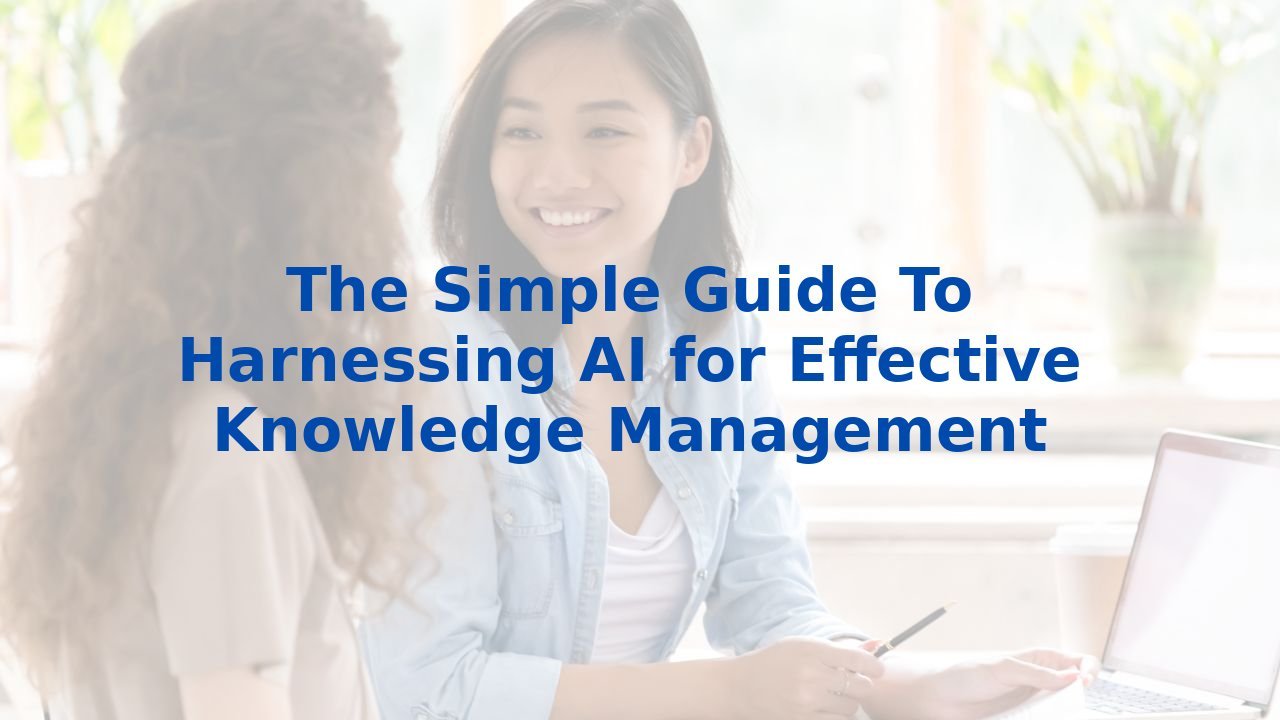The Simple Guide To Harnessing AI for Effective Knowledge Management
The Simple Guide To Harnessing AI for Effective Knowledge Management
Introduction
In today’s fast-paced business landscape, effective knowledge management (KM) isn’t just a luxury; it’s a necessity. As organizations strive to leverage their knowledge assets, the integration of artificial intelligence (AI) has proven to be nothing short of transformative. Not only does AI enhance the efficiency of KM processes, but it also empowers teams to make informed decisions faster than ever before. In this guide, we’ll explore how AI can enhance various business processes related to KM and the benefits that arise from this integration.
Enhancing Knowledge Discovery and Retrieval
Knowledge retrieval presents a formidable challenge. After all, an organization’s value lies heavily in its knowledge assets, but if those assets are buried beneath layers of information, their potential is squandered. Enter AI. With the use of machine learning (ML) and natural language processing (NLP), businesses can boost their knowledge discovery processes. AI algorithms analyze user behavior and existing content to deliver personalized recommendations that help employees find relevant information with remarkable speed.
Imagine a scenario where AI-driven search platforms compile a unified index encompassing everything from internal documents to social media posts. This streamlined approach not only enhances the findability of information but also adapts to individual user contexts, ensuring that the right knowledge is available precisely when it’s needed. This efficiency can lead to a paradigm shift in productivity, allowing teams to focus on critical tasks rather than getting lost in an information overload.
Automating Knowledge Management Processes
The act of manual knowledge capture can be a daunting process filled with the potential for error. AI plays a crucial role here by automating tasks that once consumed substantial resources. Robotic process automation (RPA), for instance, helps extract and categorize knowledge from various outputs seamlessly. By deploying these technologies, organizations can adopt a systematic approach to knowledge capture, ensuring consistency and accuracy while conserving valuable time.
Consider how an AI-driven system could automatically parse through client interactions, categorizing insights efficiently. This doesn’t just reduce the burden on employees; it significantly increases the capability to understand and leverage gathered knowledge, resulting in richer, data-driven decisions.
Improving Knowledge Sharing and Collaboration
Collaboration is the cornerstone of innovation. With AI-powered collaboration platforms, knowledge sharing becomes more organic and effective. These platforms can identify gaps in knowledge and offer suggestions for relevant content, fostering an environment conducive to creativity and synergy among teams.
Through predictive analytics, AI tools can facilitate the movement of information across departments and individuals, enabling collective intelligence to thrive. A culture of collaboration is nurtured when employees have the right information at their fingertips—making team efforts more effective and inspiring continual growth.
Benefits of AI in Knowledge Management
Integrating AI into KM processes presents a host of benefits:
- Improved Efficiency: By automating routine tasks, employees are liberated to engage in more strategic initiatives—maximizing their contributions to the organization.
- Enhanced Decision-Making: AI tools deliver insights tailored to user needs, ensuring informed decision-making processes across the board.
- Increased Productivity: The reduction in time spent scouring for information allows teams to complete tasks with newfound agility.
- Better Collaboration: With real-time analytics and intelligent recommendations, AI fosters a collaborative spirit that leads to innovation and shared success.
The Importance of Employee Training for AI
While the advantages are exceptional, training employees to fully leverage AI technologies is equally vital. An organization that invests in its workforce is building a foundation for sustainable success. Training programs can lead to:
- Familiarity with AI Tools: Employees adept in AI technologies are empowered to utilize these advanced tools effectively, driving productivity.
- Improved Adoption Rates: When staff understands the nuances of AI, they’re more likely to integrate it into their workflows seamlessly, resulting in higher engagement.
- Enhanced Decision-Making Skills: With training, teams become equipped to interpret data insights skillfully, leading to more confident and sound decisions.
- Increased Efficiency: Well-trained employees can utilize AI tools optimally, further streamlining processes and paving the way for creativity.
Conclusion
The synergy between AI and knowledge management represents a significant leap towards organizational excellence. By automating mundane tasks, enhancing decision-making capabilities, and fostering collaborative environments, AI unlocks untapped potential in businesses eager to thrive in the digital age. A commitment to training employees in utilizing these technologies is not just advantageous; it’s essential. As organizations navigate their paths toward digital transformation, investing in the interplay between AI and knowledge management will undoubtedly forge a future rich with possibilities and success.
Embracing AI isn’t merely about technology; it's a mindset—a journey toward innovation, efficiency, and sustainable growth.



